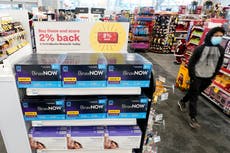‘Do better’: Outrage as White House officials reject mailing free at-home tests for Covid-19
Officials dismiss idea that US could distribute free rapid tests despite such approaches being integral to the pandemic response in other nations
White House officials have defended a widely criticised plan to allow Americans with private medical insurance to file reimbursement claims for at-home Covid-19 testing kits, rather than make them freely available to all Americans without any upfront costs.
On 6 December, press secretary Jen Psaki appeared to mock the idea of the government mailing them to households, and coronavirus response coordinator Jeff Zeints said on 7 December that the reimbursement plan from Joe Biden’s administration is the “most efficient and effective approach” to testing in the US.
The plan, which would take effect in mid-January, is part of a series of actions to combat the public health crisis as it enters a third year.
The new policy will not cover upfront costs for store-bought rapid at-home kits, which can range from $10 to $25 at pharmacies in the US. Instead, the roughly 150 million Americans with private insurance plans must file reimbursement claims with their insurance providers. Private insurers already cover in-office tests.
Americans with public insurance through Medicare and Medicaid programmes will not be eligible for reimbursements. The policy also does not cover out-of-pocket costs for millions of uninsured Americans.
Availability and access to PCR testing and antigen rapid tests at public sites and clinics varies widely across the US, and in-demand at-home kits face supply shortages and come with relatively high prices compared to other countries where tests are cheap or free and widely available.
Experts have argued that widely available rapid testing is a key component – along with face coverings and vaccines – to control infections.
A November report from the Kaiser Family Foundation points to the relatively high cost and lack of insurance coverage for at-home tests as barriers to expanding such testing in the US, as rapid testing has become integral to school reopenings and returning to work.
The US is boosting supplies of 50 million at-home tests to be “distributed through key community sites, such as health centers and rural clinics,” according to the White House. The US government supports roughly 20,000 locations where Americans can get tested for free.
How and when Americans can access those sites, and how state and local governments manage public testing centres, vary from state to state and city to city.
During a press briefing on Monday, NPR reporter Mara Liasson pressed Ms Psaki on the obstacles facing millions of Americans to readily access such tests, while Ms Psaki rejected the idea that the US could “send one to every American” despite such approaches being integral to the pandemic response in other nations.
She asked: “There are still a lot of countries like Germany and the UK and South Korea that basically have massive testing free of charge or for a nominal fee. Why can’t that be done in the United States?”
Ms Psaki pointed to the Food and Drug Administration’s approval of eight tests, a “gold standard” that she suggested may have not necessarily been met by other countries.
“Our objective is to increase accessibility and decrease costs,” she said. “If you look at what we’ve done over the course of time, we’ve quadrupled the size of our testing plan, we’ve cut the cost significantly over the past few months, and this effort to ensure insurers are able to get your tests funded means 150 million Americans will get free tests.”
The reporter continued: “That’s kind of complicated though. Why not just make them free … and have them available everywhere?”
“Should we just send one to every American?” she replied. “Then what happens if every American has one test? How much does that cost, and then what happens after that?”
“All I know is that other countries seem to be making them available in greater quantities, for less money,” Ms Liasson replied.
“I think we share the same objective, which is to make them less expensive and more accessible, right?” said Ms Psaki, again suggesting that testing in other countries is inferior compared to tests in the US that have met the FDA’s approval process.
When asked on Tuesday why the US isn’t sending rapid tests to every American, Mr Zeints said: “We believe the most efficient and effective approach is more nuanced than that.”
“If you have private insurance we’re making sure you’ll get reimbursed by your insurer,” he said. “Everyone in America has access to free testing in an efficient and effective way.”
Yale University epidemiologist Gregg Gonsalves said Ms Psaki’s answer “was terrible, flippant, wrong.”
“Rapid tests are hard to get, expensive [and] could be a key intervention in fighting [Covid-19],” he said on Twitter. “Other countries have figured out better ways to get these tools into the hands of their citizens. Do better.”
Join our commenting forum
Join thought-provoking conversations, follow other Independent readers and see their replies
Comments
Bookmark popover
Removed from bookmarks